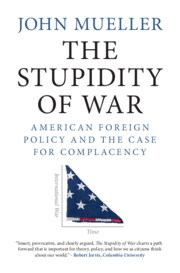Book contents
- The Stupidity of War
- The Stupidity of War
- Copyright page
- Dedication
- Contents
- Figures
- Acknowledgements
- Additional material
- Prologue The Rise of War Aversion and the Decline of International War
- Part I Assessing the Threat Record
- 1 Korea, Massive Extrapolation, Deterrence, and the Crisis Circus
- 2 Containment, Vietnam, and the Curious End of the Cold War
- 3 Military Intervention and the Continued Quest for Threat after the Cold War
- 4 Al-Qaeda and the 9/11 Wars in Afghanistan, Iraq, Pakistan
- 5 Chasing Terrorists Around the Globe and Other Post-9/11 Ventures
- Part II Evaluating Present Threats
- Afterword Aversion to International War as an Explanatory Variable
- Appendix: A Sardonic Litany
- Notes
- References
- Index
3 - Military Intervention and the Continued Quest for Threat after the Cold War
from Part I - Assessing the Threat Record
Published online by Cambridge University Press: 01 March 2021
- The Stupidity of War
- The Stupidity of War
- Copyright page
- Dedication
- Contents
- Figures
- Acknowledgements
- Additional material
- Prologue The Rise of War Aversion and the Decline of International War
- Part I Assessing the Threat Record
- 1 Korea, Massive Extrapolation, Deterrence, and the Crisis Circus
- 2 Containment, Vietnam, and the Curious End of the Cold War
- 3 Military Intervention and the Continued Quest for Threat after the Cold War
- 4 Al-Qaeda and the 9/11 Wars in Afghanistan, Iraq, Pakistan
- 5 Chasing Terrorists Around the Globe and Other Post-9/11 Ventures
- Part II Evaluating Present Threats
- Afterword Aversion to International War as an Explanatory Variable
- Appendix: A Sardonic Litany
- Notes
- References
- Index
Summary
In the wake of the Cold War, the formerly Communist countries in East Europe, with Western support and urging, took up capitalism and democracy with considerable alacrity. With the demise of the Soviet Union, there was a quest to identify new threats in the succeeding decade. Most of these, however, were already out there during the Cold War: proliferation, terrorism, drugs, oil dependence, and economic and environment “challenges.” A new opportunity brought forward by the ending of the Cold War was that former enemies could work together to police the world. Disciplined policing forces were effective in pacifying thug-dominated conflicts and in removing thuggish regimes in Panama, Somalia (at least at first), Rwanda, Croatia, Bosnia, Kosovo, East Timor, and Sierra Leone. And the Gulf War of 1991 chiefly showed how easy it is to run over an enemy that had little strategy, tactics, defenses, morale, or leadership. However, the deaths of tens of thousands in the war and in its immediate aftermath might have been avoided through negotiation. These ventures were mostly ad hoc, and it is much too grand to consider them to constitute exercises in “liberal hegemony” or a “liberal world order.”
Keywords
- Type
- Chapter
- Information
- The Stupidity of WarAmerican Foreign Policy and the Case for Complacency, pp. 65 - 88Publisher: Cambridge University PressPrint publication year: 2021

